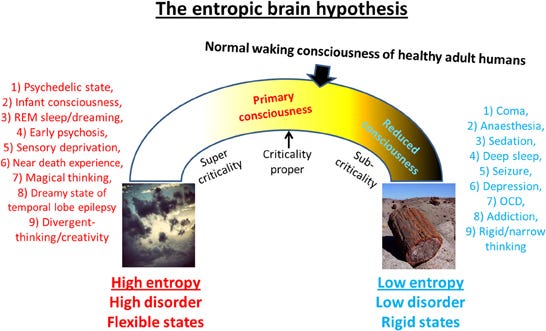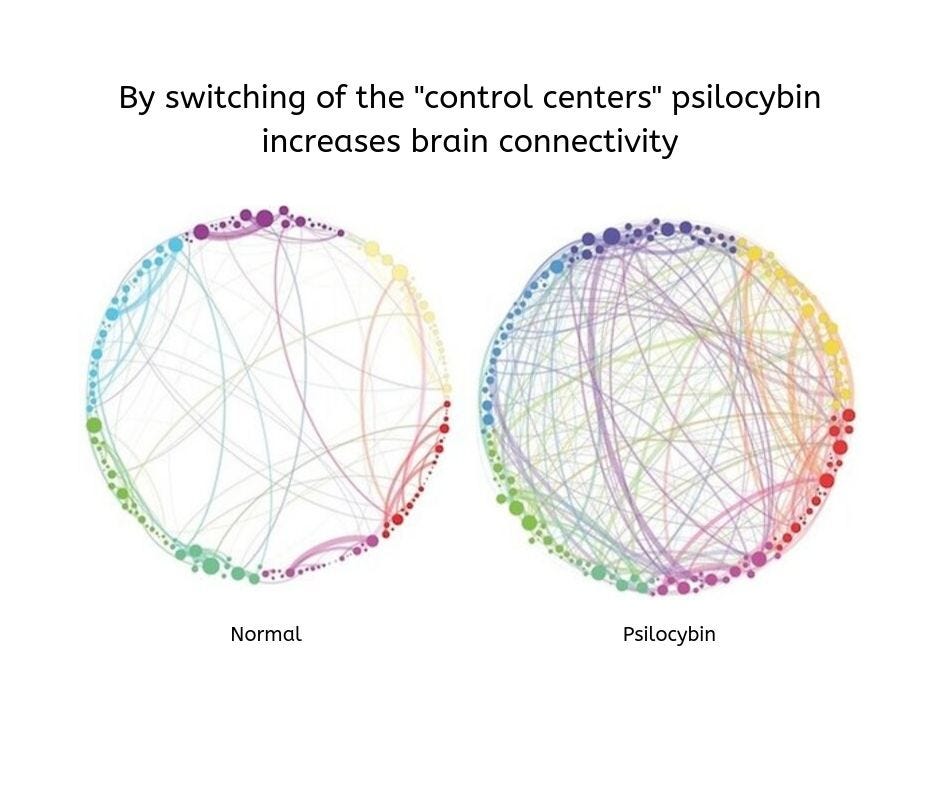When I first heard the word "psychedelics," it just sounded like other addictive drugs that make people go crazy. However, psychedelics seem to have many therapeutic effects such as causing lasting improved well-being and curing many psychological disorders.
I got curious about how I feel all those emotions and what's happening in the brain. In retrospect, I have been always a naturalist who believes in what I can see physically. My thought was that chemicals can mediate any experience even if that's my emotions.
When I was depressed, the feeling was different, but I didn't have any explanation as to what that was. Just the sense of nothingness and stuckness.
Michael Pollan’s How to Change Your Mind offered a lot of insights into one way of understanding how we experience things, how the brain works, and its relationship with psychedelics.
Let’s dive into it.
Psychedelics and the Default Mode Network
Psychedelics are a class of psychoactive substances that cause psychological changes in perception and cognitive processes. The chemicals in psychedelics drugs work on key regions in the brain to alter our "usual" version of reality. Although it depends on the compound, some of the common experiences are visual alteration, mystical/religious experience.
Some of the commonly used psychedelics are psilocybin, LSD, and DMT. Psilocybin is known to be found in magic mushrooms as it is a naturally occurring substance while LSD is a man-made substance (DMT can be synthesized but it is also found in many plants and animals).
Although many psychedelics are illegal worldwide (because of its history), there are many pieces of research on how psychedelics act on the brain and one's experience.
Psychedelics had been treating different types of conditions including depression, addiction, OCD, schizophrenia, autism, and end-of-life anxiety since the beginning of psychedelics research in the early 50s into the early 10s, according to How to Change Your Mind.
Stanislav Grof—a pioneering researcher of the use of altered states of consciousness for purposes of healing, growth, and insight—once claimed that the value of psychedelics is "comparable to the value the microscope has for biology or the telescope has for astronomy."
Dr. Robin Carhart-Harris and his colleagues at the Imperial College London found that psilocybin, one of the common psychedelic substances, lowers brain activity in a network in the brain called the Default Mode Network.
The network works as a hub of the brain connecting parts of the evolutionarily newer cerebral cortex to evolutionarily older parts of the brain that are responsible for memory, emotion, etc...
The DMN activates when we engage in metacognitive processes such as the construction of the self or ego and thinking about one's self, others, the past, and the future. It creates a sense of self and gives humans the ability to imagine what it is like to be someone else. Those functions seem to exclusively belong to humans, especially adults.
This is where your mind wanders. This is what you activate when you ruminate. In fact, psychologists have identified a strong correlation between unhappiness and time spent in mind wandering, which is performed by the DMN.
We're activating the default mode network too much when we engage in depressive thinking patterns. Depression makes one's self more enlarged than it should be to the point where it disconnects you from reality.
Maybe I was thinking about myself too much and couldn't see what's present in the outside world. Looking back, the description seems about right. I might have had a filter in my brain that fixated my perception of reality.
Psilocybin seems to reduce activity in the DMN sharply. What follows is the temporary dissolution of one's ego, and the sense of boundaries disappears like there is no separation between you and the rest of the world.
A study at Johns Hopkins found that many people who had "complete mystical experiences" by taking psychedelics reported long-term increases in their "openness to experience" and improvements in well-being.
It suggests that in the process of rewiring the brain, some changes happen in the brain that leads to long-term results.
Anyone's brain has this ability called neural plasticity that allows the brain to change and reorganize itself throughout one's life. Your brain never stops learning and changes in, for example, the way you perceive the world, are always possible.
For the brain to learn, it requires new formations of neural circuits. The more you use the same neural circuits, the stronger they get. Psychedelics seem to make the brain more "flexible" so that it gets easier to get out of the same patterns and to form the new connections in the brain. This function of psychedelics might be the reason why the psychedelic experience allows people to be more open-minded and happier.
The spectrum of Cognitive States
This spectrum of cognitive states explains how different levels of "entropy" are linked to different mental conditions.

You are almost in the center of the spectrum if you're a healthy adult.
If you go to the left, on the high-entropy end (more flexible states), there are psychedelic state, infant consciousness, and divergent/creative thinking among others.
In The Philosophical Baby, Dr. Gopnik calls these states the lantern consciousness. When you're on this end, you're like a child. You don't have any filter that alters and optimizes the reality you broadcast. Children seem always more creative than adults, sadly. They see the world as their playground. The whole universe is there for them to explore. We, as adults, try to get creative like them, but the feeling of creativity is harder to achieve.
In a way, psychedelics make you be your childhood self again for a short amount of time. Back to the time, you were naturally more creative. In other words, if you can see the world as your playground, it is perhaps easier for you to reach the high-entropy end. Do you?
On the more low-entropy end, on the other hand, we have addiction, depression, OCD, and rigid/narrow thinking if we go all the way to the end of the spectrum.
This end is closer to adults' normal waking consciousness, which Dr. Gopnik calls the spotlight consciousness. This state lets us do our adult things like focusing attention on what's important or learning from the past. Those functions are essential for achieving our long-term goals and probably what makes us humans.
However, when it goes too far to the point you have an excess of order in the brain, that causes psychological disorders. Depression, for instance, might be a result of a hyperactive default mode network, which that disconnects us from the world by putting us in loops of destructive thinking.
The Brain under the Influence of Psilocybin
The Imperial College lab used brain scanning technologies to see what's going on in one's brain when the individual takes in psilocybin. The visualization is stunning and beautiful.

This shows that a high-entropy brain's DMN gets disintegrated while other parts of the brain that are usually not connected, get more integrated making a new series of connections in the brain. The new connections might be sourcing the increased level of creativity that form new meanings in the brain.
When this psychedelic experience happens, your ego disappears and your mind expands. This type of experience is accessible to everyone to some degree. Some of the similar experiences could be a sense of awe, gratitude, open-mindedness, connection.
That's why nature helps and amazes you. Imagine one of the greatest views you've seen. When you encounter a great view, you go "Awe." You realize you're connected to nature. You can't help but see yourself as a tiny part of the world. That is the opposite of thinking yourself as the center of the world. That's what your ego does.
I personally feel this dissolution of self when I go see good music concerts as well. The live sound and aesthetics never fail me to go "Awe." I get absorbed in the scene. What's left is the sound and the sense of interconnectedness. I strongly feel this is why people still go to concerts when they can listen to music anytime on their Spotify (or Apple Music).
What about when you are grateful? You're more open to people. You feel the connection with other people. You realize your life is greatly entangled with others. I often hear being grateful as one of the most popular antidotes to depressive thinking. This seems to be the mechanism behind it.
Then, like psychedelics do, enriching those mental qualities might be the key for enhanced well-being, boosted creativity, or curing rigid mental disorders such as depression.
A small but significant thing to do to serve the goal could be embracing those feelings that expand your mind like gratitude, love, awe, or connectedness.
The psychologist Dr. Rick Hanson tells in his book on positive neural plasticity training, Hardwiring Happiness, that
“On average, about a third of a person’s strengths are innate, built into his or her genetically based temperament, talents, mood, and personality. The other two-thirds are developed over time. You get them by growing them… it means that we can develop the happiness and other inner strengths that foster fulfillment, love, effectiveness, wisdom, and inner peace.”
Other tools could be practices like meditation that lets you experience an altered state of consciousness. In fact, the brains of long-term meditators look much like the brains of people on psilocybin. Meditation seems to work just like psychedelics reducing activity in the DMN.
Although psychedelics seem to be not addictive and highly effective in improving well-being, it still poses possibilities of bad psychedelic experiences or bad trips if the drugs are taken with no assistance from professional doctors or therapists.
However, if accompanied by the right professionals, the research has been showing that there is an extremely low possibility of bad experiences. (The concept of set and setting is one thing that is important for any psychedelic trips, which professional therapists create)
The researchers in the psychedelics field still have many trials to go through for the drugs to get approved. But, I look forward to the day psychedelics and an altered state of consciousness become accessible to everyone.
If you haven’t read and want to know about psychedelics, I highly recommend How to Change Your Mind by Michael Pollan. It covers most of the ideas I mentioned here in addition to more details about the neuroscience, the history of psychedelics research, his own psychedelic journeys, and much more.
I am on Twitter. Comments, feedback, book/article recommendations, anything is welcome.
from Hacker News https://ift.tt/2TN1mkm
No comments:
Post a Comment
Note: Only a member of this blog may post a comment.